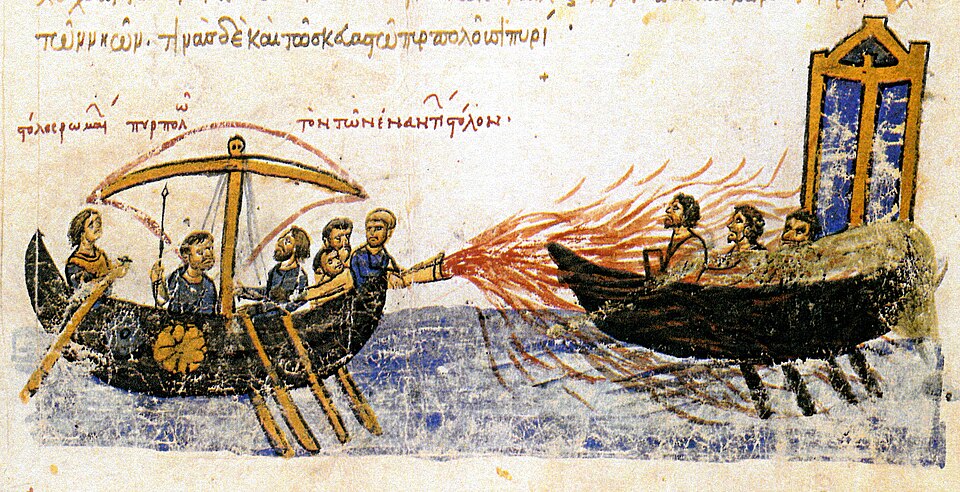Your basket is currently empty!
Introduction
Greek Fire was one of the most feared weapons of the medieval world. Developed by the Byzantine Empire in the 7th century, this incendiary substance could ignite on contact with water, making it an unparalleled tool in naval warfare. Its terrifying effectiveness and the mystery surrounding its exact composition have made Greek Fire a legendary subject of military history.
What Was Greek Fire?
Greek Fire was a flammable liquid weapon used primarily in naval battles. Unlike ordinary fire, it could continue burning even when doused with water, causing devastating damage to enemy ships and personnel. The Byzantines deployed it through specialized siphons mounted on their warships or from defensive positions on city walls.
The precise formula of Greek Fire was a closely guarded state secret and has been lost to history, sparking centuries of speculation among historians and scientists alike.
Historical Context: The Byzantine Empire’s Defense
The Byzantine Empire faced continuous threats from naval powers, especially during the Arab sieges in the 7th and 8th centuries. Greek Fire first appeared during this turbulent period, providing the Byzantines a decisive edge in defending Constantinople and other key coastal cities.
Its use was pivotal in repelling Arab fleets in battles such as the Siege of Constantinople (673–678) and subsequent naval engagements. Greek Fire helped maintain Byzantine control over the eastern Mediterranean for centuries.
How Was Greek Fire Used?
Greek Fire was typically projected using a type of flamethrower mounted on ships or city walls. The weapon worked by spraying the incendiary liquid onto enemy vessels, which would then burst into flames that were incredibly difficult to extinguish.
Some historical accounts describe the weapon being ejected under pressure through bronze tubes, effectively acting as an early form of flamethrower. Its psychological impact was enormous, often causing panic and chaos among opposing forces.
Composition: The Greatest Mystery
The exact ingredients of Greek Fire remain unknown. Ancient texts mention substances like petroleum, quicklime, sulfur, and resin, but no definitive recipe has survived.
Modern researchers have proposed various hypotheses, including mixtures of crude oil or naphtha with chemicals that ignite upon contact with water or air. Attempts to recreate Greek Fire have been inconclusive, preserving its aura as a military secret lost to time.
The Impact of Greek Fire on Warfare

Greek Fire represented a revolutionary leap in medieval military technology. It was not only a physical weapon but also a psychological tool, intimidating enemies who feared the unstoppable flames.
Its use helped the Byzantines maintain naval supremacy for centuries, delaying the expansion of hostile powers in the Mediterranean. The weapon’s success also inspired other cultures to develop incendiary weapons, shaping the evolution of warfare.
Decline and Legacy
The secret of Greek Fire was eventually lost due to the fall of Constantinople and the passage of time. By the late medieval period, the weapon disappeared from the battlefield.
Despite this, Greek Fire’s legacy lives on as one of history’s most intriguing examples of chemical warfare. It is referenced in countless historical accounts, inspiring legends, books, and modern scientific curiosity.
Why Greek Fire Still Fascinates Us Today
Greek Fire’s combination of mystery, devastating power, and technological innovation continues to captivate historians, military enthusiasts, and scientists. The idea that an ancient empire wielded such an advanced and terrifying weapon challenges our understanding of medieval warfare.
Ongoing research into Greek Fire sheds light on ancient chemistry and military strategy, reminding us how innovation can shape the fate of empires.
Conclusion
Greek Fire was more than just a weapon; it was a symbol of Byzantine ingenuity and resilience. Its terrifying ability to burn on water changed naval warfare and helped protect an empire for centuries. Though its exact formula remains a secret lost to history, Greek Fire’s impact on military technology and legend endures to this day.

